2023年中考英语总复习--动词时态专题(部分无答案)
文档属性
| 名称 | 2023年中考英语总复习--动词时态专题(部分无答案) |
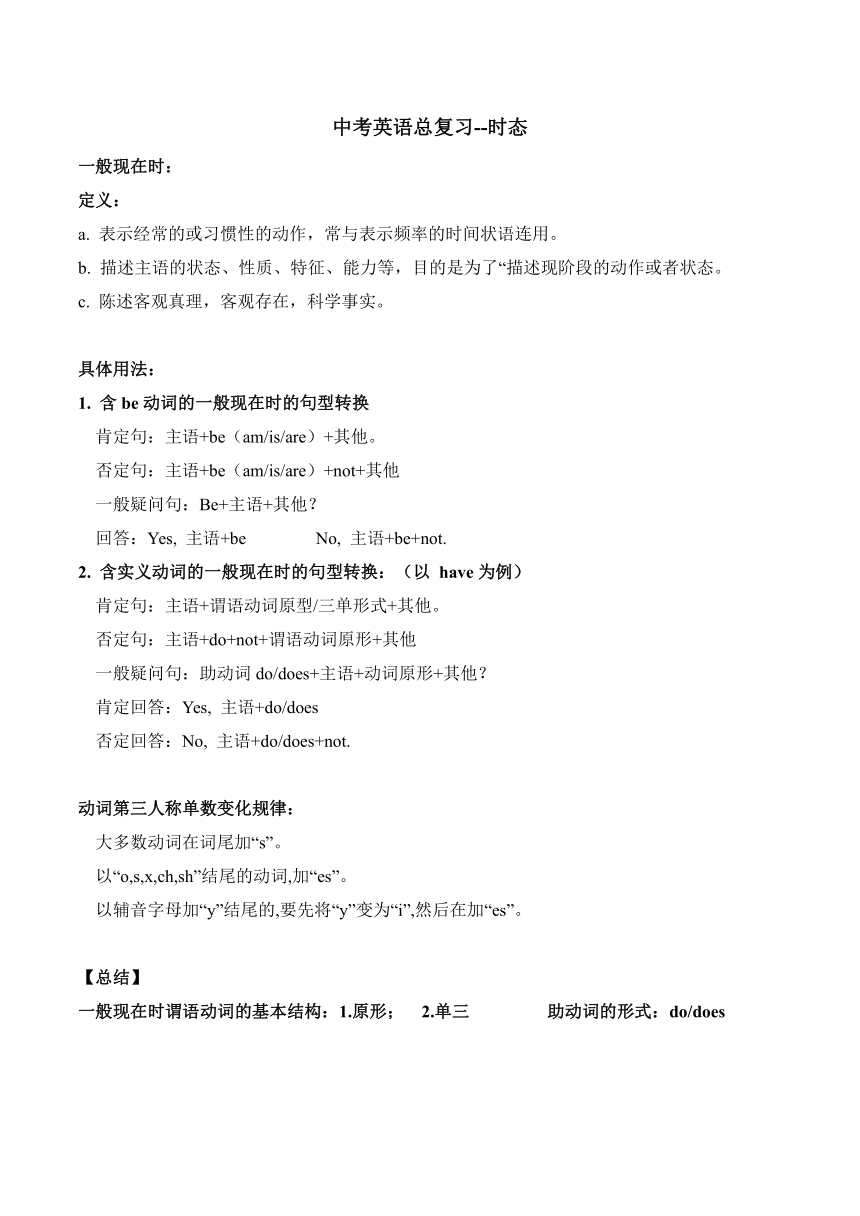
|
|
| 格式 | docx | ||
| 文件大小 | 34.3KB | ||
| 资源类型 | 教案 | ||
| 版本资源 | 人教新目标(Go for it)版 | ||
| 科目 | 英语 | ||
| 更新时间 | 2023-02-28 15:59:52 | ||
图片预览

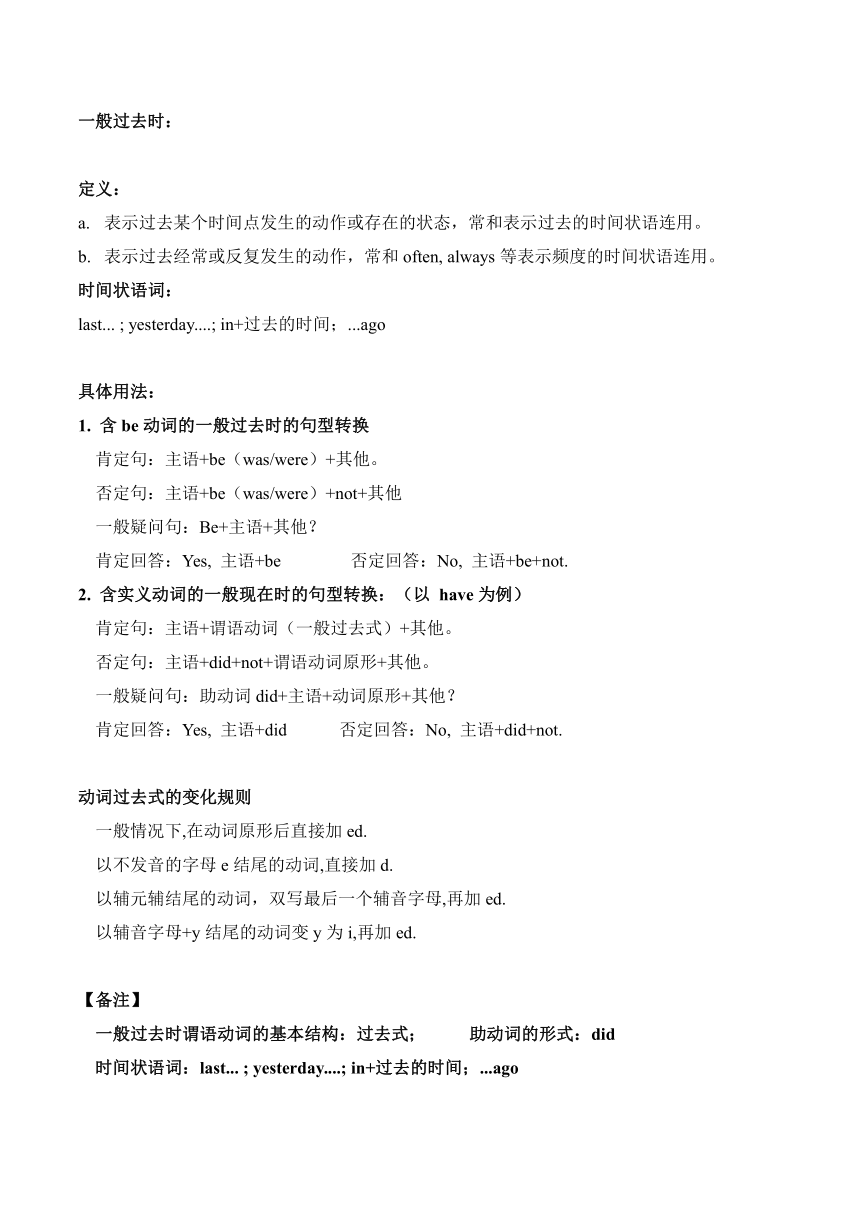
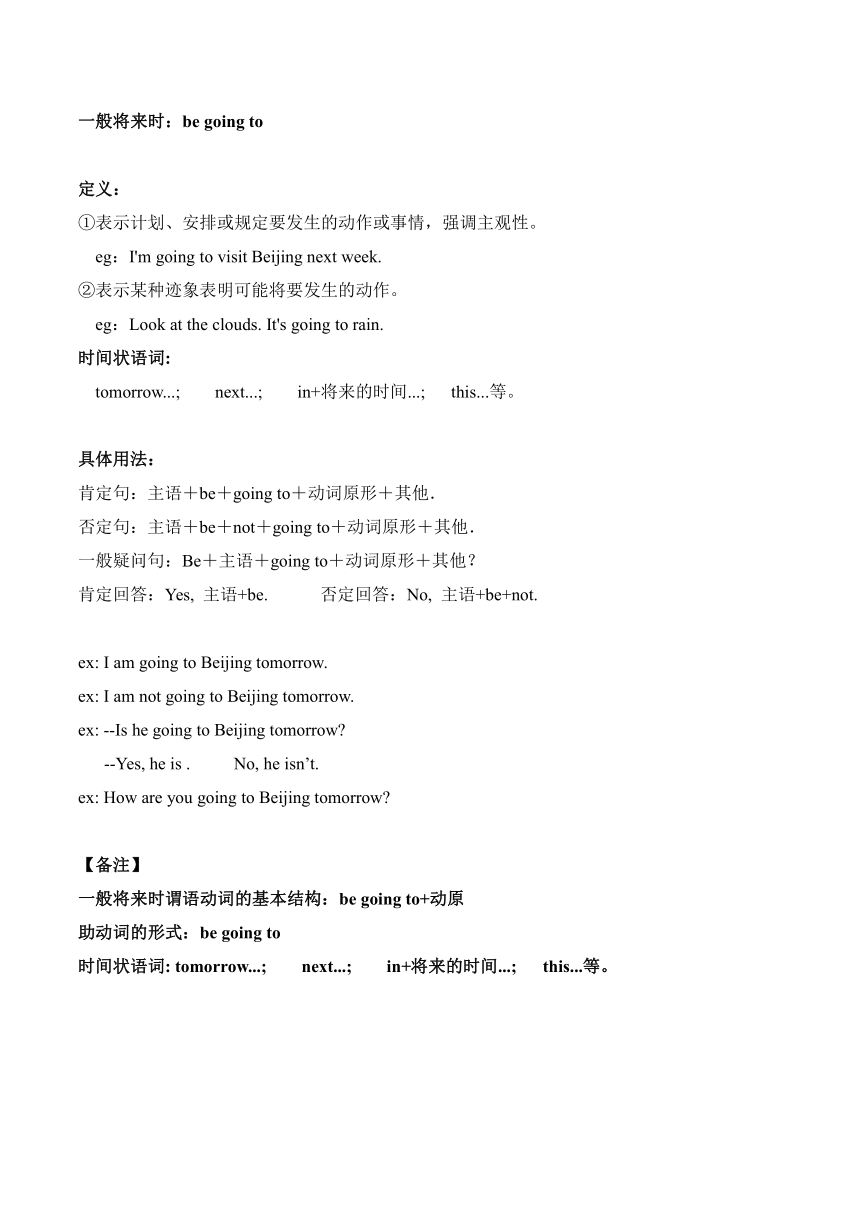
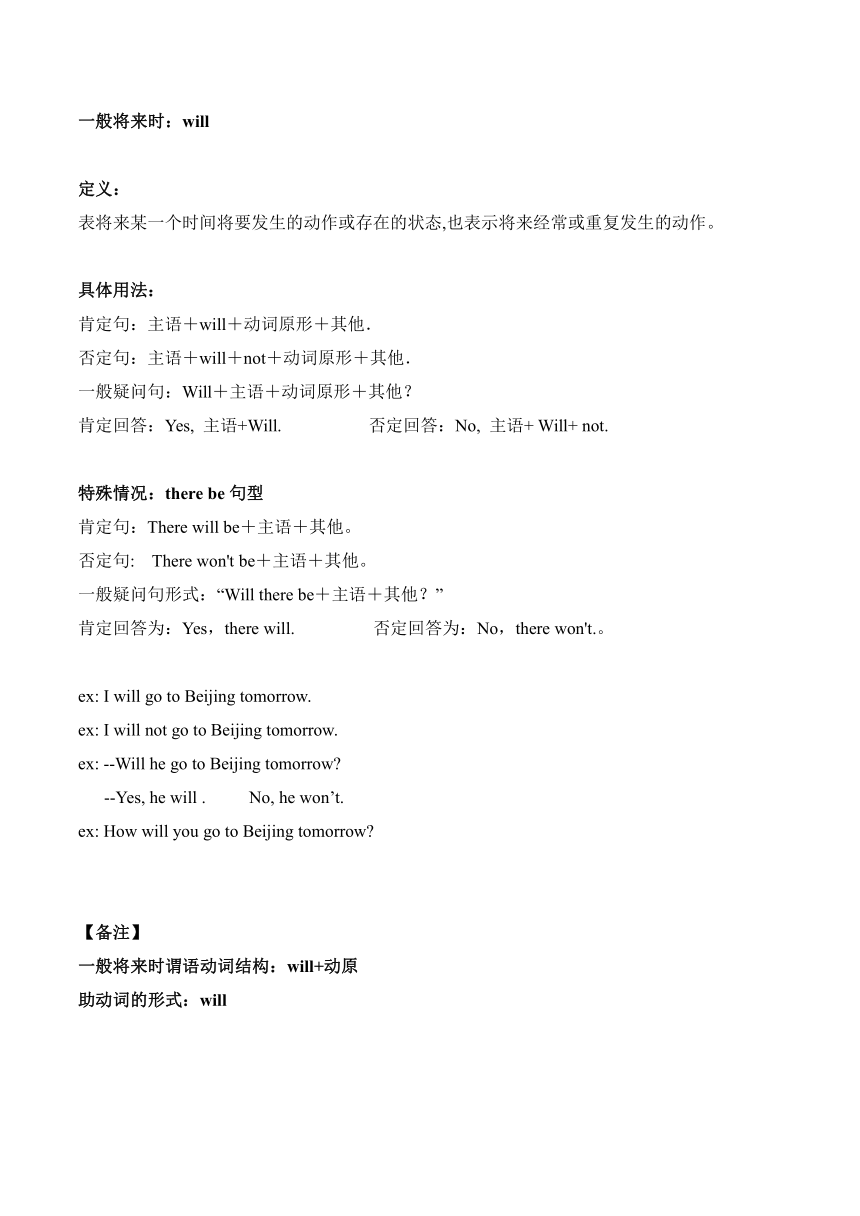
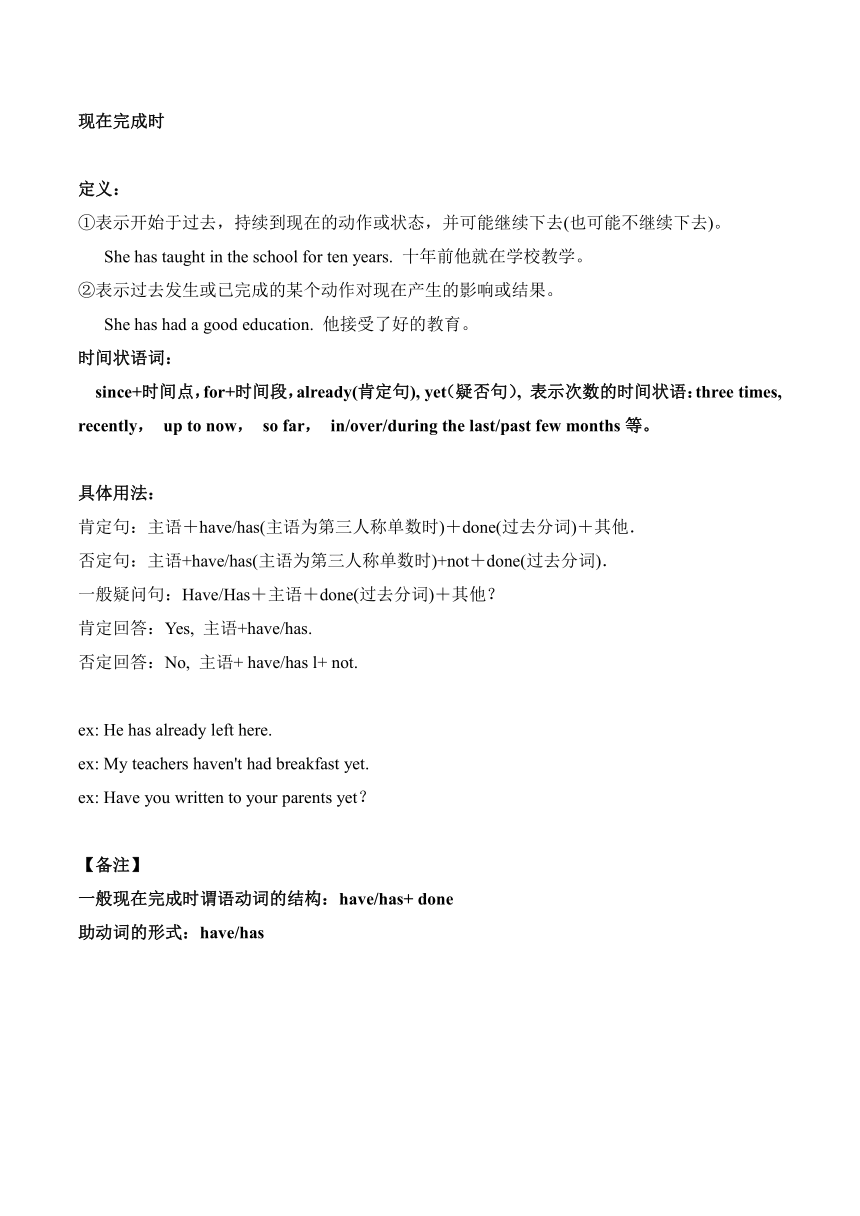
文档简介
中考英语总复习--时态
一般现在时:
定义:
a. 表示经常的或习惯性的动作,常与表示频率的时间状语连用。
b. 描述主语的状态、性质、特征、能力等,目的是为了“描述现阶段的动作或者状态。
c. 陈述客观真理,客观存在,科学事实。
具体用法:
1. 含be动词的一般现在时的句型转换
肯定句:主语+be(am/is/are)+其他。
否定句:主语+be(am/is/are)+not+其他
一般疑问句:Be+主语+其他?
回答:Yes, 主语+be No, 主语+be+not.
2. 含实义动词的一般现在时的句型转换:(以 have为例)
肯定句:主语+谓语动词原型/三单形式+其他。
否定句:主语+do+not+谓语动词原形+其他
一般疑问句:助动词do/does+主语+动词原形+其他?
肯定回答:Yes, 主语+do/does
否定回答:No, 主语+do/does+not.
动词第三人称单数变化规律:
大多数动词在词尾加“s”。
以“o,s,x,ch,sh”结尾的动词,加“es”。
以辅音字母加“y”结尾的,要先将“y”变为“i”,然后在加“es”。
【总结】
一般现在时谓语动词的基本结构:1.原形; 2.单三 助动词的形式:do/does
一般过去时:
定义:
表示过去某个时间点发生的动作或存在的状态,常和表示过去的时间状语连用。
表示过去经常或反复发生的动作,常和often, always等表示频度的时间状语连用。
时间状语词:
last... ; yesterday....; in+过去的时间;...ago
具体用法:
1. 含be动词的一般过去时的句型转换
肯定句:主语+be(was/were)+其他。
否定句:主语+be(was/were)+not+其他
一般疑问句:Be+主语+其他?
肯定回答:Yes, 主语+be 否定回答:No, 主语+be+not.
2. 含实义动词的一般现在时的句型转换:(以 have为例)
肯定句:主语+谓语动词(一般过去式)+其他。
否定句:主语+did+not+谓语动词原形+其他。
一般疑问句:助动词did+主语+动词原形+其他?
肯定回答:Yes, 主语+did 否定回答:No, 主语+did+not.
动词过去式的变化规则
一般情况下,在动词原形后直接加ed.
以不发音的字母e结尾的动词,直接加d.
以辅元辅结尾的动词,双写最后一个辅音字母,再加ed.
以辅音字母+y结尾的动词变y为i,再加ed.
【备注】
一般过去时谓语动词的基本结构:过去式; 助动词的形式:did
时间状语词:last... ; yesterday....; in+过去的时间;...ago
一般将来时:be going to
定义:
①表示计划、安排或规定要发生的动作或事情,强调主观性。
eg:I'm going to visit Beijing next week.
②表示某种迹象表明可能将要发生的动作。
eg:Look at the clouds. It's going to rain.
时间状语词:
tomorrow...; next...; in+将来的时间...; this...等。
具体用法:
肯定句:主语+be+going to+动词原形+其他.
否定句:主语+be+not+going to+动词原形+其他.
一般疑问句:Be+主语+going to+动词原形+其他?
肯定回答:Yes, 主语+be. 否定回答:No, 主语+be+not.
ex: I am going to Beijing tomorrow.
ex: I am not going to Beijing tomorrow.
ex: --Is he going to Beijing tomorrow
--Yes, he is . No, he isn’t.
ex: How are you going to Beijing tomorrow
【备注】
一般将来时谓语动词的基本结构:be going to+动原
助动词的形式:be going to
时间状语词: tomorrow...; next...; in+将来的时间...; this...等。
一般将来时:will
定义:
表将来某一个时间将要发生的动作或存在的状态,也表示将来经常或重复发生的动作。
具体用法:
肯定句:主语+will+动词原形+其他.
否定句:主语+will+not+动词原形+其他.
一般疑问句:Will+主语+动词原形+其他?
肯定回答:Yes, 主语+Will. 否定回答:No, 主语+ Will+ not.
特殊情况:there be句型
肯定句:There will be+主语+其他。
否定句: There won't be+主语+其他。
一般疑问句形式:“Will there be+主语+其他?”
肯定回答为:Yes,there will. 否定回答为:No,there won't.。
ex: I will go to Beijing tomorrow.
ex: I will not go to Beijing tomorrow.
ex: --Will he go to Beijing tomorrow
--Yes, he will . No, he won’t.
ex: How will you go to Beijing tomorrow
【备注】
一般将来时谓语动词结构:will+动原
助动词的形式:will
现在完成时
定义:
①表示开始于过去,持续到现在的动作或状态,并可能继续下去(也可能不继续下去)。
She has taught in the school for ten years. 十年前他就在学校教学。
②表示过去发生或已完成的某个动作对现在产生的影响或结果。
She has had a good education. 他接受了好的教育。
时间状语词:
since+时间点,for+时间段,already(肯定句), yet(疑否句), 表示次数的时间状语:three times, recently, up to now, so far, in/over/during the last/past few months等。
具体用法:
肯定句:主语+have/has(主语为第三人称单数时)+done(过去分词)+其他.
否定句:主语+have/has(主语为第三人称单数时)+not+done(过去分词).
一般疑问句:Have/Has+主语+done(过去分词)+其他?
肯定回答:Yes, 主语+have/has.
否定回答:No, 主语+ have/has l+ not.
ex: He has already left here.
ex: My teachers haven't had breakfast yet.
ex: Have you written to your parents yet?
【备注】
一般现在完成时谓语动词的结构:have/has+ done
助动词的形式:have/has
现在进行时:
定义:
表示说话时正在进行的或发生动作,状态。
表示现阶段正在进行而说话时不一定在进行的动作。
ex: They are compiling a dictionary. 他们在编一本词典
时间状语词:
now现在, at the moment现在,look/listen....等。
具体用法:
肯定句:主语+be(am /is/are)+动词现在分词形式+其他.
否定句:主语+ be(am /is/are)+not+动词现在分词形式+其他.
一般疑问句:Be+主语+动词现在分词形式+其他?
肯定回答:Yes, 主语+be(am /is/are).
否定回答:No, 主语+ be(am /is/are)+ not.
ex: He is reading his book.
ex: He is not reading his book.
ex: --Are you reading your book?
--Yes, I am.
--No, I am not.
【备注】
现在进行时谓语动词的基本结构:be(am /is/are) + doing
过去进行时:
定义:
1.表示过去某个具体时刻正在进行的事情或动作。
ex: We were sleeping at 9 last night .
2.表示过去某段时间内持续进行的动作或者事情。
ex: We were watching TV from seven to nine last night.
时间标志词:
at this time yesterday at that time at 8:00 yesterday evening
this morning, the whole morning, all day yesterday, from nine to ten last evening.
具体用法:
肯定句:主语+be(was/were)+动词现在分词形式+其他.
否定句:主语+ be(was/were)+not+动词现在分词形式+其他.
一般疑问句:Be+主语+动词现在分词形式+其他?
肯定回答:Yes, 主语+be(was/were).
否定回答:No, 主语+ be(was/were)+ not.
动词现在分词变化规则
① 一般情况下直接加ing
② 以不发音的字母e结尾的单词,去掉字母e,再加ing 。
③ 以“辅元辅”结尾的动词,先双写末尾的辅音字母,再加ing 。
④ 以ie结尾的动词,把ie改为y ,再加ing。
【备注】
过去进行时谓语动词的基本结构:be(was/were) + doing
【巩固练习】
一、单选题。
1.—It's ten years since we came here.
—How time flies! We ____ in China for so long.
A. work B. worked C. will work D. have worked
【答案】D
【解析】句意:-自从我们来到这里已经有10年了。-时间过得真快啊!我们在中国工作了这么长时间了。work工作,动词原形;worked工作,一般过去时;will work一般将来时;have worked现在完成时。根据对话的情景以及句中的时间状语for so long可知,这里表示从过去一直持续到现在的一个动作,应用现在完成时,故选D。
2.Amon ____________ his ship in a big storm when a giant fish came out of the sea.
A. will sail B. is sailing C. was sailing D. has sailed
【答案】C
【解析】句意:阿蒙驾船在暴风雨中航行时,一条大鱼从海里游了出来。考查动词时态辨析。本句是when引导的时间状语从句,时态遵循主过从过;根据when a giant fish came out of the sea.可知遇到大雨时阿蒙正在航行,主句需用过去进行时,故选C。
3.Students in Grade Nine ____________a maths exam at this time yesterday.
A. take B. are taking C. were taking D. have taken
【答案】C
【解析】句意:昨天这个时候九年级的学生正在参加数学考试。考查动词时态辨析。at this time yesterday昨天这个时候,用于过去进行时“was/were + doing”结构;根据句意结构和语境,可知选C。
4.--Hurry up!
--One moment. I ______ my e-mail and then I’m ready to go.
A. read B. are reading C. was reading D. have read
【答案】B
【解析】句意:——快点!——马上,我在读电子邮件,我准备走了。根据read一般现在时态的结构,are reading现在进行时态的结构,was reading过去进行时态的结构, have read现在完成时态的结构;根据One moment.和 then I’m ready to go.可知是我正在读,现在进行时态;故选B。
5.--I’ve never seen Mr. Taylor before.
--Don’t worry. I ______ him to you before the meeting.
A. will introduce B. introduced C. have introduced D. had introduced
【答案】A
【解析】句意:——以前我从来没见过Taylor先生。——不要担心,开会前我会把他介绍给你的。根据will introduce一般将来时态的结构,introduced一般过去时态的结构,have introduced现在完成时态的结构,had introduced过去完成时态的结构;根据Don’t worry.和 before the meeting.可知是将来时态;故选A。
6.--I called you last night, but nobody answered. Where were you then
--Oh, I ____________ my pet dog in my yard.
A. walked B. was walking C. am walking D. will walk
【答案】B
【解析】句意:——我昨晚给你打电话了,但是没有人接。那时你在哪里 ——哦,我在院子里遛我的宠物狗。考查动词时态辨析。根据句意语境可知,昨晚你打电话时我正在遛狗,需用过去进行时“was/were doing”结构,故选B。
7.--Daddy, when will we go out to fly a kite
--As soon as the rain______.
A. is stopping B. stopped C. will stop D. stops
【答案】D
【解析】句意:——Daddy,我们什么时候出去放风筝?——雨一停。A. is stopping正在停,现在进行时;B. stopped停止,一般过去式;C. will stop将停,一般将来时。D. stops停止,第三人称单数。这里是as soon as引导的时间状语从句,遵循主句用一般将来时,从句用一般现在时态,主语是the rain,第三人称单数,谓语动词变第三人称单数。这里的意思是说雨一停,我们就去。根据题意,故选D。
8.--Linda, Dad has finished his work and we ___________ to the gym to pick you up.
--Thank you, Mum.
A. drive B. drove C. have driven D. are driving
【答案】D
【解析】句意:——Linda,爸爸下班了,我们就要开车去健身房接你。——谢谢你们,妈妈。考查现在进行时。A. drive驾驶、开车,动词原形;B. drove过去式;C. have driven现在完成时;D. are driving现在进行时。根据Linda, Dad has finished his work and we _____ to the gym to pick you up. 可知,前半句用的是现在完成时,表示动作发生在过去,对现在造成的影响,即爸爸的工作已完成,那么现在的话就是要开车去接你,所以这里应该是“就要开车去接你”;drive可以用现在进行时形式表示将来。故答案选D。
9.Listen! The birds ______ in the trees outside our school.
A. sing B. are singing C. sang D. were singing
【答案】B
【解析】句意:听!鸟儿正在我们学校外面的树上唱歌。A. sing一般现在时;B. are singing现在进行时;C. sang一般过去时;D. were singing过去进行时。Listen是现在进行时态的标志词,故答案为B。
10.--What is your mother doing, Linda
--She ___________dinner in the kitchen now.
A. is cooking B. was cooking C. cook D. cooking
【答案】A
【解析】句意:——Linda,你的母亲正在做什么?——她现在正在厨房里做晚饭。A. is cooking 正在做,现在进行时;B. was cooking正在做,过去进行时;C. cook做,一般现在时态;D. cooking做,现在分词。根据上文What is your mother doing, Linda 可知下文用现在进行时。其结构是be doing的形式。主语是单数,be动词用is。根据题意,故选A。
11.--Where are the teachers now
--In the meeting room. They _________ the meeting for 0 minutes.
A. have begun B. have been on C. have had D. have been held
【答案】B
【解析】句意:——老师们现在在哪里?——在会议室。他们已经开会10分钟了。A. have begun已经开始;短暂性动词;B. have been on已经开始,持续性;C. have had已经有;D. have been held已经被举行。这里是主动语态,排除D;根据for 10 minutes.可知动词用持续性动词,begin变成be on。这里是完成时其结构是have been on。根据题意,故选B。
12.--Where is Catherine I haven't seen her for days.
--She ______ Wuhan. She’ll be back next week.
A. has gone to B. has been to C. have gone to D. have been to
【答案】A
【解析】句意:— —凯瑟琳在哪里?我好几天没见到她了。 — —她去了武汉。她下星期回来。have/has gone to表示“(某人)现在到某地去了”(现在不在这儿了)。have/has been to表示“(某人)曾经去过某地”,(人现在已经回来了)。根据She’ll be back next week. 她下星期回来。说明凯瑟琳去了武汉,现在还没有回来。因此选择have/has gone to,排除B/D;又因为主语是She,为单数,所以助动词用has,故选A。
13.She’s brought you some eggs. As you know, she ______chickens.
A. keeps B. will keep C. has kept D. kept
【答案】A
【解析】句意:她给你带了些鸡蛋。你知道,她养鸡。考查句子时态。A. keeps一般现在时; B. will keep一般将来时;C. has kept现在完成时; D. kept一般过去时。表达事实或真理,要使用一般现在时,结合句意可知填keeps;选A。
14.I ate some fruit, which I ______ since I was a child, and the vegetables from my garden.
A. have enjoyed B. enjoyed C. enjoy D. had enjoyed
【答案】A
【解析】句意“我吃了一些我从小就喜欢的水果,还有我的院子里的蔬菜”。A.现在完成时;B.一般过去时;C.一般现在时;D.过去完成时。根据since I was a child可知,用现在完成时,故选A。
【点睛】常见的现在完成时的标志词:in the past few years; for; since; since then; lately; so far;since+过去时间点;for+一段时间等。
15.He_____ his English teacher when he was sightseeing in Paris.
A. has met B. had met C. met D. would meet
【答案】C
【解析】句意:他在巴黎观光时遇到了他的英语老师。考查句子时态。A. has met现在完成时;B. had met过去完成时;C. met一般过去时;D. would meet过去将来时。When引导的时间状语从句,从句可以表示一段时间或时间点,从句时态可以是一般过去时或过去进行时;主句时态要使用一般过去时或过去进行时。结合句意和选项可知填met;选C。
16.—Try this soup—you ______like it,
—Wow! This is delicious!
A. must B. will C. shall D. can
【答案】B
【解析】句意“-尝一下这个汤,你会喜欢上它。-哇!真美味”。A.一定,必须;B.将要,会;C.应该;D.能。根据句意可知,第一个人让第二个人尝一下,第二个人尝完就会喜欢上这个汤,故选B。
17.-Where is Mr. Green
-He _________the bookshop. You have to wait for him.
A. was going to B. has gone to C. has been to
【答案】B
【解析】句意:——Mr. Green在哪里?——他去了书店。你必须等他。A. was going to 打算去……,过去将来时;B. has gone to去了,可能在途中,可能已经到了;C. has been to去过某地。根据下文You have to wait for him.可知上文是去了书店。根据题意,故选B。
18.-Have you ever been to Shanghai
-Of course. Actually, I _________there for six years but now I live in Taizhou.
A. worked B. was working C. would work D. have worked
【答案】A
【解析】句意:— —你去过上海吗? — —当然。实际上,我在那里工作了六年,但现在我住在台州。A为一般过去时;B为过去进行时;C为过去将来时;D为现在完成时。根据Actually, I _________there for six years but now I live in Taizhou. 实际上,我在那里工作了六年,但现在我住在台州。可知,我是六年前在上海工作的,因此应该用一般过去时,故选A。
19.--Mary, I remember you _______ several years ago.
--Yes, I ________ for 3 years.
A. married, have married B. married, married
C. married, have been married D. have married, have been married
【答案】C
【解析】句意:-Mary,我记得你几年前结婚了。-是的,我结婚三年了。married结婚,过去式;have married现在完成时;have been married系表结构,表示已婚的状态,可以和一段时间搭配使用。根据句意可知,第一句话中有several years ago,表示过去的事情,故应用一般过去时,先排除D选项。第二句话中有一段时间for 3 years,应和现在完成时搭配,且这里表示已婚的状态,应用系表结构,故应选C。
20.--Son, you have never been abroad, I’m worried about you.
--Don’t worry, mom. As soon as I ______ , I _______ you.
A. will arrive, call B. will arrive, will call
C. arrive, will call D. arrive, call
【答案】C
【解析】句意:-儿子,你从来没有出过国,我很担心你。-妈妈,不要担心,我一到达,就会给你打电话。will arrive一般将来时;arrive到达,动词原形;call打电话,动词原形;will call一般将来时。句中as soon as引导的是时间状语从句,从句中用一般现在时,主句用一般将来时,故应选C。
【趁热打铁】
单选选择。
( ) 1.Xiao Li usually ______ to school by bike last year.
goes B.went C.will go D.is going
( )2.Mr. Smith _____to see you in hour.
A.came B.has come C.will come D.comes
( )3. We_______ TV at home this time last night.
A.were watching B.watched C.have watched D.would watch
( )4.She ____ in Shang hai for ten years.
has lived B.had lived C.lived D. will live
( )5.We all know that the earth _____ round the sun.
goes B.went C.is going D.will go
( ) 6.--Where are the boys
--They________soccer on the playground.
A. play B. are playing C. were playiting D. played
( )7. Look! Lucy ______ under the tree.
A. reads B is reading C. was reading D. read
( )8.He ________ more than 200 model cars in the last five years.
A. has collected B. had collected C. collected D. will collect
( )9.Jim _______ a letter to his parents at 7: 30 last night.
A. had written B.wrote C. would write D. was writing
( )10. The Smiths__________ in Beijing since two weeks ago.
A. stayed B. were staying C. would stay D. have stayed
( )11.--When______ you _____the bike
--Last Monday.
A. have; bought B. did; buy C. will; buy D. do: buy
( )12. Look! The boy_________ English now.
A. likes B. liked C. is liking D. was liking
( )13. Most students in our class _________ TV twice a week.
A. watch B. watched C. will watch D. are watching
( )14. How soon _______ back from work.
A. do: come B. did; come C. have: come D. will: come
( )15.--Where_____ you ______ Mr.Li.
-- In his office, half an hour ago.
A.will see B. did: see C. Have,seen D. do: see
( )16. I_______ a new dictionary. Look! It's very useful.
A. bought B. will buy C. have bought D. would buy
( )17. I won’t watch the movie tonight. I_____it before.
A.will see B.have seen C. saw D. had seen
( )18. I’m going to be a doctor when I ______ up.
A.grow B.will grow C.grew D. am growing
( )19. The film_____ on for five minutes when I got too the cinema.
A.has been B.had been C.was D.is
( )20.She ____ dinner when her son came in.
A.has cooked B.had cooked C.was cooking D.would cook
二、用所给词的适当形式填空。
1. He often _________ (have) dinner at home.
2.--What is our granddaughter doing
--She___________ (listen) to music.
3. Mike didn’t __________ (finish) his homework yesterday.
4. Joan sometimes__________ (go) swimming on weekends.
5 We____________ (have)a picnic tomorrow afternoon.
6. Nick usually __________ (visit) his grandfather on Sunday.
7.They_______________ (not water) the flowers now.
8.--_______ they ________ (like) the World Cup
--Yes, they do.
9. Su Hai ___________(go) for a walk last Sunday.
10.Look! The girls________________(dance )in the classroom.
11.--________ Helen _____________ (wash )clothes
--Yes, she is.
12. It's Friday today. What________ she ________ (do) this weekend
13. Listen! Some girls _______________ (sing)in the classroom.
14. There_________ (are) five books on the desk an hour ago.
15. --Where________(be)Miss Zhang
--I don't know. But I _________ (see)her just now.
16. My brother____________ (go)to Shanghai next week.
17.1___________(am)ten years old last year. On that day, I________(blow) the candles out.
18. He _______ (sit) down and began to read his newspaper.
19. He is very hungry. He_____________ (not eat) any thing for three days.
20.I__________ (go) with you if I have time.
21. We will go to the cinema if it___________ (be) fine.
22. I will tell her the news when she___________ (come) to see me next week.
23.--When________ you _______ the car (buy)
--In1998.”
24.We____________ (be) good friends since we met at school.
25. What_______ you_______ at five yesterday afternoon (do)
三、句型转换,按要求做题。
1. I like the red sofa. (变否定句)
_______________________________
2. She has a nice cap.(变一般疑问句,并做否定回答)
_______________________________
________________
3. I am a bus driver. (变一般疑问句并做肯定回答)
_______________________________
________________
4. They are playing football in the garden now.(变成否定句)
_______________________________
5.I was at home this moring.(变一般疑问句,并做否定回答)
_______________________________
________________
He did morning exercises in the morning. (变否定句)
_______________________________
They were studying English at five yesterday.(变一般疑问句,并做肯定回答)
_______________________________
________________
She has had this book for five days. (变否定句)
_______________________________
She is going to go to Beijing to visit his parents.(变一般疑问句,并做肯定回答)
_______________________________
________________
10.She has watched this movie three times. (变否定句)
_______________________________
一般现在时:
定义:
a. 表示经常的或习惯性的动作,常与表示频率的时间状语连用。
b. 描述主语的状态、性质、特征、能力等,目的是为了“描述现阶段的动作或者状态。
c. 陈述客观真理,客观存在,科学事实。
具体用法:
1. 含be动词的一般现在时的句型转换
肯定句:主语+be(am/is/are)+其他。
否定句:主语+be(am/is/are)+not+其他
一般疑问句:Be+主语+其他?
回答:Yes, 主语+be No, 主语+be+not.
2. 含实义动词的一般现在时的句型转换:(以 have为例)
肯定句:主语+谓语动词原型/三单形式+其他。
否定句:主语+do+not+谓语动词原形+其他
一般疑问句:助动词do/does+主语+动词原形+其他?
肯定回答:Yes, 主语+do/does
否定回答:No, 主语+do/does+not.
动词第三人称单数变化规律:
大多数动词在词尾加“s”。
以“o,s,x,ch,sh”结尾的动词,加“es”。
以辅音字母加“y”结尾的,要先将“y”变为“i”,然后在加“es”。
【总结】
一般现在时谓语动词的基本结构:1.原形; 2.单三 助动词的形式:do/does
一般过去时:
定义:
表示过去某个时间点发生的动作或存在的状态,常和表示过去的时间状语连用。
表示过去经常或反复发生的动作,常和often, always等表示频度的时间状语连用。
时间状语词:
last... ; yesterday....; in+过去的时间;...ago
具体用法:
1. 含be动词的一般过去时的句型转换
肯定句:主语+be(was/were)+其他。
否定句:主语+be(was/were)+not+其他
一般疑问句:Be+主语+其他?
肯定回答:Yes, 主语+be 否定回答:No, 主语+be+not.
2. 含实义动词的一般现在时的句型转换:(以 have为例)
肯定句:主语+谓语动词(一般过去式)+其他。
否定句:主语+did+not+谓语动词原形+其他。
一般疑问句:助动词did+主语+动词原形+其他?
肯定回答:Yes, 主语+did 否定回答:No, 主语+did+not.
动词过去式的变化规则
一般情况下,在动词原形后直接加ed.
以不发音的字母e结尾的动词,直接加d.
以辅元辅结尾的动词,双写最后一个辅音字母,再加ed.
以辅音字母+y结尾的动词变y为i,再加ed.
【备注】
一般过去时谓语动词的基本结构:过去式; 助动词的形式:did
时间状语词:last... ; yesterday....; in+过去的时间;...ago
一般将来时:be going to
定义:
①表示计划、安排或规定要发生的动作或事情,强调主观性。
eg:I'm going to visit Beijing next week.
②表示某种迹象表明可能将要发生的动作。
eg:Look at the clouds. It's going to rain.
时间状语词:
tomorrow...; next...; in+将来的时间...; this...等。
具体用法:
肯定句:主语+be+going to+动词原形+其他.
否定句:主语+be+not+going to+动词原形+其他.
一般疑问句:Be+主语+going to+动词原形+其他?
肯定回答:Yes, 主语+be. 否定回答:No, 主语+be+not.
ex: I am going to Beijing tomorrow.
ex: I am not going to Beijing tomorrow.
ex: --Is he going to Beijing tomorrow
--Yes, he is . No, he isn’t.
ex: How are you going to Beijing tomorrow
【备注】
一般将来时谓语动词的基本结构:be going to+动原
助动词的形式:be going to
时间状语词: tomorrow...; next...; in+将来的时间...; this...等。
一般将来时:will
定义:
表将来某一个时间将要发生的动作或存在的状态,也表示将来经常或重复发生的动作。
具体用法:
肯定句:主语+will+动词原形+其他.
否定句:主语+will+not+动词原形+其他.
一般疑问句:Will+主语+动词原形+其他?
肯定回答:Yes, 主语+Will. 否定回答:No, 主语+ Will+ not.
特殊情况:there be句型
肯定句:There will be+主语+其他。
否定句: There won't be+主语+其他。
一般疑问句形式:“Will there be+主语+其他?”
肯定回答为:Yes,there will. 否定回答为:No,there won't.。
ex: I will go to Beijing tomorrow.
ex: I will not go to Beijing tomorrow.
ex: --Will he go to Beijing tomorrow
--Yes, he will . No, he won’t.
ex: How will you go to Beijing tomorrow
【备注】
一般将来时谓语动词结构:will+动原
助动词的形式:will
现在完成时
定义:
①表示开始于过去,持续到现在的动作或状态,并可能继续下去(也可能不继续下去)。
She has taught in the school for ten years. 十年前他就在学校教学。
②表示过去发生或已完成的某个动作对现在产生的影响或结果。
She has had a good education. 他接受了好的教育。
时间状语词:
since+时间点,for+时间段,already(肯定句), yet(疑否句), 表示次数的时间状语:three times, recently, up to now, so far, in/over/during the last/past few months等。
具体用法:
肯定句:主语+have/has(主语为第三人称单数时)+done(过去分词)+其他.
否定句:主语+have/has(主语为第三人称单数时)+not+done(过去分词).
一般疑问句:Have/Has+主语+done(过去分词)+其他?
肯定回答:Yes, 主语+have/has.
否定回答:No, 主语+ have/has l+ not.
ex: He has already left here.
ex: My teachers haven't had breakfast yet.
ex: Have you written to your parents yet?
【备注】
一般现在完成时谓语动词的结构:have/has+ done
助动词的形式:have/has
现在进行时:
定义:
表示说话时正在进行的或发生动作,状态。
表示现阶段正在进行而说话时不一定在进行的动作。
ex: They are compiling a dictionary. 他们在编一本词典
时间状语词:
now现在, at the moment现在,look/listen....等。
具体用法:
肯定句:主语+be(am /is/are)+动词现在分词形式+其他.
否定句:主语+ be(am /is/are)+not+动词现在分词形式+其他.
一般疑问句:Be+主语+动词现在分词形式+其他?
肯定回答:Yes, 主语+be(am /is/are).
否定回答:No, 主语+ be(am /is/are)+ not.
ex: He is reading his book.
ex: He is not reading his book.
ex: --Are you reading your book?
--Yes, I am.
--No, I am not.
【备注】
现在进行时谓语动词的基本结构:be(am /is/are) + doing
过去进行时:
定义:
1.表示过去某个具体时刻正在进行的事情或动作。
ex: We were sleeping at 9 last night .
2.表示过去某段时间内持续进行的动作或者事情。
ex: We were watching TV from seven to nine last night.
时间标志词:
at this time yesterday at that time at 8:00 yesterday evening
this morning, the whole morning, all day yesterday, from nine to ten last evening.
具体用法:
肯定句:主语+be(was/were)+动词现在分词形式+其他.
否定句:主语+ be(was/were)+not+动词现在分词形式+其他.
一般疑问句:Be+主语+动词现在分词形式+其他?
肯定回答:Yes, 主语+be(was/were).
否定回答:No, 主语+ be(was/were)+ not.
动词现在分词变化规则
① 一般情况下直接加ing
② 以不发音的字母e结尾的单词,去掉字母e,再加ing 。
③ 以“辅元辅”结尾的动词,先双写末尾的辅音字母,再加ing 。
④ 以ie结尾的动词,把ie改为y ,再加ing。
【备注】
过去进行时谓语动词的基本结构:be(was/were) + doing
【巩固练习】
一、单选题。
1.—It's ten years since we came here.
—How time flies! We ____ in China for so long.
A. work B. worked C. will work D. have worked
【答案】D
【解析】句意:-自从我们来到这里已经有10年了。-时间过得真快啊!我们在中国工作了这么长时间了。work工作,动词原形;worked工作,一般过去时;will work一般将来时;have worked现在完成时。根据对话的情景以及句中的时间状语for so long可知,这里表示从过去一直持续到现在的一个动作,应用现在完成时,故选D。
2.Amon ____________ his ship in a big storm when a giant fish came out of the sea.
A. will sail B. is sailing C. was sailing D. has sailed
【答案】C
【解析】句意:阿蒙驾船在暴风雨中航行时,一条大鱼从海里游了出来。考查动词时态辨析。本句是when引导的时间状语从句,时态遵循主过从过;根据when a giant fish came out of the sea.可知遇到大雨时阿蒙正在航行,主句需用过去进行时,故选C。
3.Students in Grade Nine ____________a maths exam at this time yesterday.
A. take B. are taking C. were taking D. have taken
【答案】C
【解析】句意:昨天这个时候九年级的学生正在参加数学考试。考查动词时态辨析。at this time yesterday昨天这个时候,用于过去进行时“was/were + doing”结构;根据句意结构和语境,可知选C。
4.--Hurry up!
--One moment. I ______ my e-mail and then I’m ready to go.
A. read B. are reading C. was reading D. have read
【答案】B
【解析】句意:——快点!——马上,我在读电子邮件,我准备走了。根据read一般现在时态的结构,are reading现在进行时态的结构,was reading过去进行时态的结构, have read现在完成时态的结构;根据One moment.和 then I’m ready to go.可知是我正在读,现在进行时态;故选B。
5.--I’ve never seen Mr. Taylor before.
--Don’t worry. I ______ him to you before the meeting.
A. will introduce B. introduced C. have introduced D. had introduced
【答案】A
【解析】句意:——以前我从来没见过Taylor先生。——不要担心,开会前我会把他介绍给你的。根据will introduce一般将来时态的结构,introduced一般过去时态的结构,have introduced现在完成时态的结构,had introduced过去完成时态的结构;根据Don’t worry.和 before the meeting.可知是将来时态;故选A。
6.--I called you last night, but nobody answered. Where were you then
--Oh, I ____________ my pet dog in my yard.
A. walked B. was walking C. am walking D. will walk
【答案】B
【解析】句意:——我昨晚给你打电话了,但是没有人接。那时你在哪里 ——哦,我在院子里遛我的宠物狗。考查动词时态辨析。根据句意语境可知,昨晚你打电话时我正在遛狗,需用过去进行时“was/were doing”结构,故选B。
7.--Daddy, when will we go out to fly a kite
--As soon as the rain______.
A. is stopping B. stopped C. will stop D. stops
【答案】D
【解析】句意:——Daddy,我们什么时候出去放风筝?——雨一停。A. is stopping正在停,现在进行时;B. stopped停止,一般过去式;C. will stop将停,一般将来时。D. stops停止,第三人称单数。这里是as soon as引导的时间状语从句,遵循主句用一般将来时,从句用一般现在时态,主语是the rain,第三人称单数,谓语动词变第三人称单数。这里的意思是说雨一停,我们就去。根据题意,故选D。
8.--Linda, Dad has finished his work and we ___________ to the gym to pick you up.
--Thank you, Mum.
A. drive B. drove C. have driven D. are driving
【答案】D
【解析】句意:——Linda,爸爸下班了,我们就要开车去健身房接你。——谢谢你们,妈妈。考查现在进行时。A. drive驾驶、开车,动词原形;B. drove过去式;C. have driven现在完成时;D. are driving现在进行时。根据Linda, Dad has finished his work and we _____ to the gym to pick you up. 可知,前半句用的是现在完成时,表示动作发生在过去,对现在造成的影响,即爸爸的工作已完成,那么现在的话就是要开车去接你,所以这里应该是“就要开车去接你”;drive可以用现在进行时形式表示将来。故答案选D。
9.Listen! The birds ______ in the trees outside our school.
A. sing B. are singing C. sang D. were singing
【答案】B
【解析】句意:听!鸟儿正在我们学校外面的树上唱歌。A. sing一般现在时;B. are singing现在进行时;C. sang一般过去时;D. were singing过去进行时。Listen是现在进行时态的标志词,故答案为B。
10.--What is your mother doing, Linda
--She ___________dinner in the kitchen now.
A. is cooking B. was cooking C. cook D. cooking
【答案】A
【解析】句意:——Linda,你的母亲正在做什么?——她现在正在厨房里做晚饭。A. is cooking 正在做,现在进行时;B. was cooking正在做,过去进行时;C. cook做,一般现在时态;D. cooking做,现在分词。根据上文What is your mother doing, Linda 可知下文用现在进行时。其结构是be doing的形式。主语是单数,be动词用is。根据题意,故选A。
11.--Where are the teachers now
--In the meeting room. They _________ the meeting for 0 minutes.
A. have begun B. have been on C. have had D. have been held
【答案】B
【解析】句意:——老师们现在在哪里?——在会议室。他们已经开会10分钟了。A. have begun已经开始;短暂性动词;B. have been on已经开始,持续性;C. have had已经有;D. have been held已经被举行。这里是主动语态,排除D;根据for 10 minutes.可知动词用持续性动词,begin变成be on。这里是完成时其结构是have been on。根据题意,故选B。
12.--Where is Catherine I haven't seen her for days.
--She ______ Wuhan. She’ll be back next week.
A. has gone to B. has been to C. have gone to D. have been to
【答案】A
【解析】句意:— —凯瑟琳在哪里?我好几天没见到她了。 — —她去了武汉。她下星期回来。have/has gone to表示“(某人)现在到某地去了”(现在不在这儿了)。have/has been to表示“(某人)曾经去过某地”,(人现在已经回来了)。根据She’ll be back next week. 她下星期回来。说明凯瑟琳去了武汉,现在还没有回来。因此选择have/has gone to,排除B/D;又因为主语是She,为单数,所以助动词用has,故选A。
13.She’s brought you some eggs. As you know, she ______chickens.
A. keeps B. will keep C. has kept D. kept
【答案】A
【解析】句意:她给你带了些鸡蛋。你知道,她养鸡。考查句子时态。A. keeps一般现在时; B. will keep一般将来时;C. has kept现在完成时; D. kept一般过去时。表达事实或真理,要使用一般现在时,结合句意可知填keeps;选A。
14.I ate some fruit, which I ______ since I was a child, and the vegetables from my garden.
A. have enjoyed B. enjoyed C. enjoy D. had enjoyed
【答案】A
【解析】句意“我吃了一些我从小就喜欢的水果,还有我的院子里的蔬菜”。A.现在完成时;B.一般过去时;C.一般现在时;D.过去完成时。根据since I was a child可知,用现在完成时,故选A。
【点睛】常见的现在完成时的标志词:in the past few years; for; since; since then; lately; so far;since+过去时间点;for+一段时间等。
15.He_____ his English teacher when he was sightseeing in Paris.
A. has met B. had met C. met D. would meet
【答案】C
【解析】句意:他在巴黎观光时遇到了他的英语老师。考查句子时态。A. has met现在完成时;B. had met过去完成时;C. met一般过去时;D. would meet过去将来时。When引导的时间状语从句,从句可以表示一段时间或时间点,从句时态可以是一般过去时或过去进行时;主句时态要使用一般过去时或过去进行时。结合句意和选项可知填met;选C。
16.—Try this soup—you ______like it,
—Wow! This is delicious!
A. must B. will C. shall D. can
【答案】B
【解析】句意“-尝一下这个汤,你会喜欢上它。-哇!真美味”。A.一定,必须;B.将要,会;C.应该;D.能。根据句意可知,第一个人让第二个人尝一下,第二个人尝完就会喜欢上这个汤,故选B。
17.-Where is Mr. Green
-He _________the bookshop. You have to wait for him.
A. was going to B. has gone to C. has been to
【答案】B
【解析】句意:——Mr. Green在哪里?——他去了书店。你必须等他。A. was going to 打算去……,过去将来时;B. has gone to去了,可能在途中,可能已经到了;C. has been to去过某地。根据下文You have to wait for him.可知上文是去了书店。根据题意,故选B。
18.-Have you ever been to Shanghai
-Of course. Actually, I _________there for six years but now I live in Taizhou.
A. worked B. was working C. would work D. have worked
【答案】A
【解析】句意:— —你去过上海吗? — —当然。实际上,我在那里工作了六年,但现在我住在台州。A为一般过去时;B为过去进行时;C为过去将来时;D为现在完成时。根据Actually, I _________there for six years but now I live in Taizhou. 实际上,我在那里工作了六年,但现在我住在台州。可知,我是六年前在上海工作的,因此应该用一般过去时,故选A。
19.--Mary, I remember you _______ several years ago.
--Yes, I ________ for 3 years.
A. married, have married B. married, married
C. married, have been married D. have married, have been married
【答案】C
【解析】句意:-Mary,我记得你几年前结婚了。-是的,我结婚三年了。married结婚,过去式;have married现在完成时;have been married系表结构,表示已婚的状态,可以和一段时间搭配使用。根据句意可知,第一句话中有several years ago,表示过去的事情,故应用一般过去时,先排除D选项。第二句话中有一段时间for 3 years,应和现在完成时搭配,且这里表示已婚的状态,应用系表结构,故应选C。
20.--Son, you have never been abroad, I’m worried about you.
--Don’t worry, mom. As soon as I ______ , I _______ you.
A. will arrive, call B. will arrive, will call
C. arrive, will call D. arrive, call
【答案】C
【解析】句意:-儿子,你从来没有出过国,我很担心你。-妈妈,不要担心,我一到达,就会给你打电话。will arrive一般将来时;arrive到达,动词原形;call打电话,动词原形;will call一般将来时。句中as soon as引导的是时间状语从句,从句中用一般现在时,主句用一般将来时,故应选C。
【趁热打铁】
单选选择。
( ) 1.Xiao Li usually ______ to school by bike last year.
goes B.went C.will go D.is going
( )2.Mr. Smith _____to see you in hour.
A.came B.has come C.will come D.comes
( )3. We_______ TV at home this time last night.
A.were watching B.watched C.have watched D.would watch
( )4.She ____ in Shang hai for ten years.
has lived B.had lived C.lived D. will live
( )5.We all know that the earth _____ round the sun.
goes B.went C.is going D.will go
( ) 6.--Where are the boys
--They________soccer on the playground.
A. play B. are playing C. were playiting D. played
( )7. Look! Lucy ______ under the tree.
A. reads B is reading C. was reading D. read
( )8.He ________ more than 200 model cars in the last five years.
A. has collected B. had collected C. collected D. will collect
( )9.Jim _______ a letter to his parents at 7: 30 last night.
A. had written B.wrote C. would write D. was writing
( )10. The Smiths__________ in Beijing since two weeks ago.
A. stayed B. were staying C. would stay D. have stayed
( )11.--When______ you _____the bike
--Last Monday.
A. have; bought B. did; buy C. will; buy D. do: buy
( )12. Look! The boy_________ English now.
A. likes B. liked C. is liking D. was liking
( )13. Most students in our class _________ TV twice a week.
A. watch B. watched C. will watch D. are watching
( )14. How soon _______ back from work.
A. do: come B. did; come C. have: come D. will: come
( )15.--Where_____ you ______ Mr.Li.
-- In his office, half an hour ago.
A.will see B. did: see C. Have,seen D. do: see
( )16. I_______ a new dictionary. Look! It's very useful.
A. bought B. will buy C. have bought D. would buy
( )17. I won’t watch the movie tonight. I_____it before.
A.will see B.have seen C. saw D. had seen
( )18. I’m going to be a doctor when I ______ up.
A.grow B.will grow C.grew D. am growing
( )19. The film_____ on for five minutes when I got too the cinema.
A.has been B.had been C.was D.is
( )20.She ____ dinner when her son came in.
A.has cooked B.had cooked C.was cooking D.would cook
二、用所给词的适当形式填空。
1. He often _________ (have) dinner at home.
2.--What is our granddaughter doing
--She___________ (listen) to music.
3. Mike didn’t __________ (finish) his homework yesterday.
4. Joan sometimes__________ (go) swimming on weekends.
5 We____________ (have)a picnic tomorrow afternoon.
6. Nick usually __________ (visit) his grandfather on Sunday.
7.They_______________ (not water) the flowers now.
8.--_______ they ________ (like) the World Cup
--Yes, they do.
9. Su Hai ___________(go) for a walk last Sunday.
10.Look! The girls________________(dance )in the classroom.
11.--________ Helen _____________ (wash )clothes
--Yes, she is.
12. It's Friday today. What________ she ________ (do) this weekend
13. Listen! Some girls _______________ (sing)in the classroom.
14. There_________ (are) five books on the desk an hour ago.
15. --Where________(be)Miss Zhang
--I don't know. But I _________ (see)her just now.
16. My brother____________ (go)to Shanghai next week.
17.1___________(am)ten years old last year. On that day, I________(blow) the candles out.
18. He _______ (sit) down and began to read his newspaper.
19. He is very hungry. He_____________ (not eat) any thing for three days.
20.I__________ (go) with you if I have time.
21. We will go to the cinema if it___________ (be) fine.
22. I will tell her the news when she___________ (come) to see me next week.
23.--When________ you _______ the car (buy)
--In1998.”
24.We____________ (be) good friends since we met at school.
25. What_______ you_______ at five yesterday afternoon (do)
三、句型转换,按要求做题。
1. I like the red sofa. (变否定句)
_______________________________
2. She has a nice cap.(变一般疑问句,并做否定回答)
_______________________________
________________
3. I am a bus driver. (变一般疑问句并做肯定回答)
_______________________________
________________
4. They are playing football in the garden now.(变成否定句)
_______________________________
5.I was at home this moring.(变一般疑问句,并做否定回答)
_______________________________
________________
He did morning exercises in the morning. (变否定句)
_______________________________
They were studying English at five yesterday.(变一般疑问句,并做肯定回答)
_______________________________
________________
She has had this book for five days. (变否定句)
_______________________________
She is going to go to Beijing to visit his parents.(变一般疑问句,并做肯定回答)
_______________________________
________________
10.She has watched this movie three times. (变否定句)
_______________________________
同课章节目录
- 词法
- 名词
- 动词和动词短语
- 动词语态
- 动词时态
- 助动词和情态动词
- 非谓语动词
- 冠词
- 代词
- 数词和量词
- 形容词副词及其比较等级
- 介词和介词短语
- 连词和感叹词
- 构词法
- 相似、相近词比较
- 句法
- 陈述句
- 一般疑问句和否定疑问句
- 特殊疑问句及选择疑问句
- 反意疑问句
- 存在句(There be句型)
- 宾语从句
- 定语从句
- 状语从句
- 主谓一致问题
- 简单句
- 并列句
- 复合句
- 主谓一致
- 主、表语从句
- 名词性从句
- 直接引语和间接引语
- 虚拟语气
- 感叹句
- 强调句
- 倒装句
- 祈使句
- 句子的成分
- 句子的分类
- 题型专区
- 单项选择部分
- 易错题
- 完形填空
- 阅读理解
- 词汇练习
- 听说训练
- 句型转换
- 补全对话
- 短文改错
- 翻译
- 书面表达
- 任务型阅读
- 语法填空
- 其他资料
